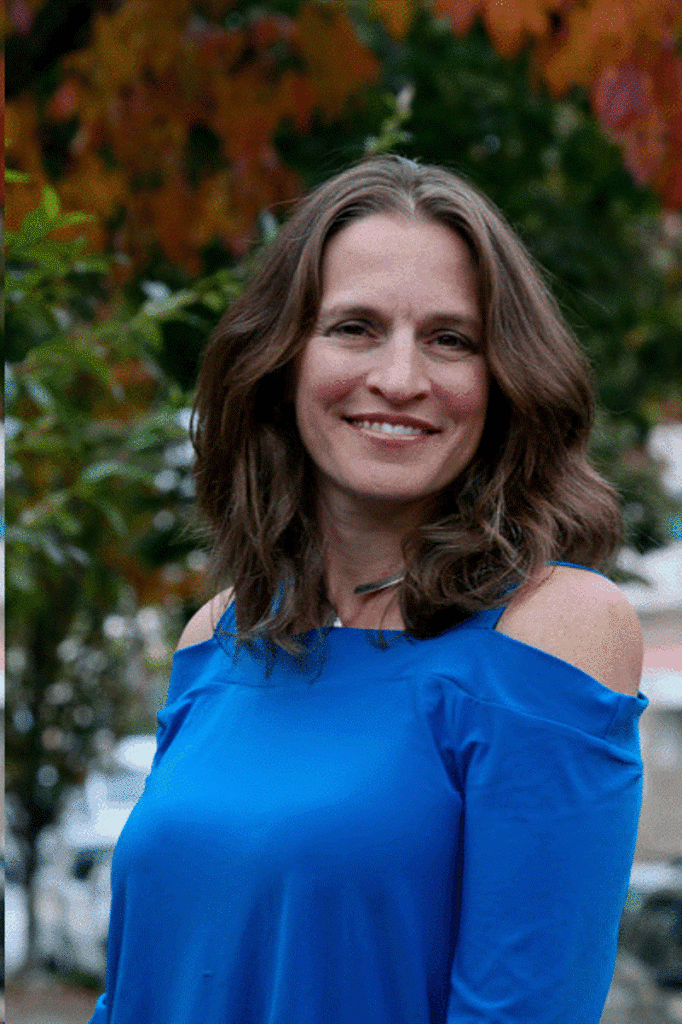An unexpected encounter between a 31-year-old artist and a 20-year-old student at an S&M party in New York quickly turns from playful flirting to a dark and dangerous game of sexual power in Theatre Exile’s Philadelphia premiere of SMOKE, the critically acclaimed 75-minute stunner by Kim Davies. Following a rehearsal of the provocative two-hander with actors Matteo Scammell and Merci Lyons-Cox in the intimate space of Theatre X, director Deborah Block discussed the play’s socio-sexual themes and the challenges she faced in reaching the right balance between its overt erotic content and its underlying cautionary message. [Studio X, 1340 S. 13th Street] February 18-March 13, 2016; theatreexile.org.

PHINDIE: When did this show first come to your attention?
DEBORAH BLOCK: I can’t remember exactly; I know it was running in New York [2014-15] when I first read it, though I never saw it on stage.
PHINDIE: What attracted you to it for production at Theatre Exile, in terms of the company’s mission?
DB: The story is based on Strindberg’s Miss Julie, so it’s bold and painful, with real human issues. I was attracted to the ever-changing power dynamics between the two characters, Julie and John, and I appreciated the fact that it attacks some sensitive themes, such as sexual violence, the nuances of victimhood, differences in class and age, whose world it is and who’s a visitor in it, and people trying to take control, but not in a healthy way. In keeping with Exile’s mission, it addresses important parts of the human condition that we don’t often like to bring out into the open to discuss; there’s exploration and provocation, grit and passion. I particularly liked that the dynamics of SMOKE are always changing, that the play doesn’t give answers, but it asks the questions in uncomfortable ways, and it shows who gets hurt in the end.
PHINDIE: The premise of the play revolves around an S&M party, with a dominant male and a submissive woman—a complete reversal of the original S&M novella of 1870, VENUS IN FURS, by Leopold von Sacher-Masoch, after whom masochism is named. What does that say about our current culture and its view of women?
DB: That’s how it begins, but the character of Julie is reluctant to accept the labels that define BDSM, so here the roles are constantly reversed. The continual shifting of control is very well done by the playwright.
PHINDIE: There’s a scene in which Julie strips. I find it odd in many shows that when women have sex, or want to have sex, they get undressed, but men somehow manage to remain fully clothed! Isn’t that what women have always had to do to get what they want, to pander to heterosexual male fantasy?
DB: Yes, women have always had to do that! And in this play, a 20-year-old girl thinks this is what she has to do. She’s not very successful at it, but that’s how she believes she has to behave and what she should be, because of the way women are seen in our society and what is expected of us.

PHINDIE: How are you approaching that scene?
DB: There are certainly sexual politics and dynamics, and it does get aggressive, but in this production there is as much skin shown by him as by her; his shirt comes off, his pants open, but there’s no real nudity; too much nudity would detract from the message. It’s also important to remember that the BDSM world doesn’t always go fully into sex, sometimes it’s just play. The set design for the show reflects that kind of playful attitude towards S&M. It takes place in the kitchen of one of John’s friends, and along with all the typical kitchen appliances and dishware, sex toys are integrated into the room’s furnishings—a dildo on the counter, a butt plug on the handle of a cabinet, anal beads on a candy-cane Christmas ornament, vagina shot glasses. They’re treated casually, as a normal part of the apartment’s ambience, nothing unusual.
PHINDIE: With that said, how do you prevent the production from becoming a gratuitous exploitation of sex, instead of keeping the audience’s attention focused on the narrative tension and the serious socio-sexual message?
DB: Carefully! That’s the only thing I can say. It’s been my goal, and the only way I’ll know if I achieved it is once the audiences are here and I can gauge their reactions. There is no definitive answer given in the play, but I hope I succeed in inspiring people to begin the conversation about potentially dangerous sexual interactions.
PHINDIE: Why did you want to direct it?
DB: I found it especially compelling in that it considers the nuances of what it means to be a young woman trying to find her way to adulthood. It’s difficult emotionally, and telling her story felt like something I always say: “Who’s watching the children?” Julie’s past the legal age of eighteen, but John is 31, so she’s still young and needs guidance; the truth is that sexual freedom is very hard to navigate. The story takes place in the BDSM community, where there are certain roles and rules in place, so everyone can be safe; there must be clear consent. In real life, consent is not always that precise, it becomes nuanced. I wanted to make sure that there’s a conversation about people not being ready to behave the way they think they’d like to. They become easy victims, and it’s too easy for society to blame them after they’ve gotten into a bad situation that they didn’t fully expect to encounter or didn’t really have the maturity, experience, or control to navigate.
PHINDIE: Is there an underlying feminist message in the play, written by a woman playwright and chosen for production by a woman director?
DB: I won’t answer that in terms of a ‘feminist’ philosophy, but I will say that I believe that women are very powerful, though in our society there are many obstacles that are put in our way, so we don’t always believe that we have any power. It’s a struggle for women, and it’s very difficult to break the mold of gender expectations–which isn’t good for either sex.
PHINDIE: As a director, how do you walk the thin line inherent in SMOKE between victim blaming and a cautionary tale for women?
DB: From the get-go, that has been my directorial challenge, and it terrifies me! If you’ve seen my work at Exile over the past few years, the endings of the plays I’ve directed are tricky. That’s definitely the case with this one; and because the line is so thin, if I’m not careful, the play could be interpreted as the complete opposite of what I intended. We have in Julie a young woman who is 20, and it’s very significant that she’s between eighteen and 21, the two ages that mark adulthood in our country. She wants to be an adult, she thinks she’s ready, but she can’t quite guide herself through the world of sexual politics that she’s entered. I’m happy that women in our country have the right to choose what they want to do, to dress as they like without being attacked, but then I realize there’s this place between the ideal and the reality; that’s where this play takes us, while stepping outside of a politically-correct conversation. I do hope I walk the line, because it’s a challenge to show the complexities of what is happening in our society now. Children feel like adults, and believe that they’re capable of negotiating their sexuality, but then they find themselves in situations they can’t handle. As a result, they’re victimized, blamed, labeled as liars and whores, then as a society we walk away, and leave them to deal with the aftermath.
PHINDIE: How do you view the characters?
DB: They’re very much like the people I know—a little broken, a little charming, genuinely wanting to do the right thing, genuinely wanting to find their place in the world, genuinely not knowing how to do it. They are flawed, but neither is evil. The playwright is great because she uses all the emotions—humor, darkness, playfulness, vulnerability. Moments are dropped in to give the backstories of the characters, to make them three-dimensional, not just sexual.

PHINDIE: What special qualities do the actors bring to these roles?
DB: Both Matteo and Merci are bold, and both recognize that it’s a very challenging play with something important to say. It’s necessary for both of them to be vulnerable, and they are willing to do that. There has been a lot of laughter during rehearsals because some of the sexual situations in the play are funny; the characters are cute and fun and playful, so the actors are laughing with each other. I don’t want to give the impression that it’s all dark and heavy, but sometimes the laughter is to relieve some of the sexual tension, a kind of nervous laughter. They’re both excellent actors who are feeling the changing emotions and power dynamics. It’s all about when the actors feel safe, both with each other and in the context of the production, so they can express that vulnerability.
PHINDIE: What do you hope the audience will take away from SMOKE?
DB: I hope it illuminates the issues in an aggressive way, without resolving them, so that the audience will continue to think about them and to consider what the answers are. The play doesn’t tell you, I don’t tell you; you have to come to your own conclusions.
Thank you, Deborah, for making the time during a busy rehearsal week to talk to Phindie about this intriguing production!
[Studio X, 1340 S. 13th Street] February 18-March 13, 2016; theatreexile.org.
